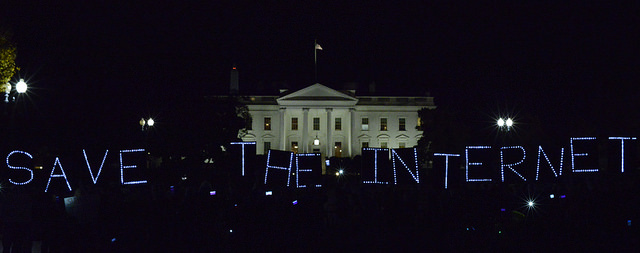Blog
Brands Making Bold Purpose-Driven Commitments

The internet has been live with commentary about net neutrality and the recent Federal Communications Commission (FCC) vote to overturn previously initiated regulations received overwhelming criticism on social media.
While Internet Service Providers (ISPs) that supported the FCC ruling – such as AT&T, Verizon, Comcast and Spectrum – fielded backlash from unhappy consumers, Google stood out from its competitors by promoting a “free and open” internet.
Prior to the ruling, the tech company hosted a web page showcasing its support for net neutrality. The page stated, “Thanks in part to net neutrality, the open internet has grown to become an unrivaled source of choice, competition, innovation, free expression, and opportunity. And it should stay that way.”
Although Google isn’t primarily known as an ISP, Alphabet, In.c (Google’s parent company) has been rolling out its own high speed internet service in select cities throughout the US. This service, called Google Fiber, is scheduled for widespread expansion in the coming years.
As the world’s largest search engine, Google has already built and strong internet brand and is in a strategic position to attract consumers to adopt Google Fiber.
With the recent controversy around net neutrality and Google’s unique stance, the company is building a stronger case to get consumers to switch to Google Fiber if and when it’s available.
Ultimately, by joining a cultural conversation, establishing a clear difference between the competition and staying true to its ethos, Google is able to leverage its stance on net neutrality to build consumer goodwill.
Companies that use their business to create meaningful change in the world strengthen connections with consumers and build a strong brand.
By defining and sharing your purpose, you can clarify why your brand exists to both your internal community and external stakeholders. What’s more, corporate purpose acts as a compass to guide right action and fulfill a mission.
This clarity and commitment to something bigger than profit-for-profits-sake makes your business meaningful for consumers, who increasingly want to support brands that are building a better world.
Google’s mission is to “Organize the world’s information and make it universally accessible and useful.” It follows, that the company would support maintaining net neutrality.
In fact, it would clearly contradict Google’s mission if ISPs do implement so called fast lanes and slow lanes that give preferential placement and speed to websites that pay a premium.
Essentially, Google’s stance on net neutrality shines a light on its core values of free and open access to information. Google can then use Google Fiber to progress its mission, which not only builds consumer goodwill, but also helps it carve out a competitive advantage against other ISPs.
The key takeaway is to utilize your core business to fulfill a higher purpose, which will ultimately lead to long term business success and a better world.
Causes that create opportunity, increase transparency and empower people to achieve their dreams resonate more in the hearts of consumers than causes that restrict possibility, limit information and make it more difficult for others to reach their goals.
Net neutrality is important because it helped maintain freedom of information and transparency on the internet. What’s more, a free and open internet has been the breeding grounds for some of today’s most innovative companies.
As former FCC Chairman Julius Genachowski said, “Net neutrality was essential for our economy; it was essential to preserve freedom and openness, both for economic reasons and free speech reasons.”
Google’s decision to support a free and open internet – rather than back the FCC repeal – was a solid branding decision.
The lesson here is that, from a branding perspective, you should support causes that provide the most people with the most opportunity. This not only aligns your brand with equality, but also shows consumers that your company is taking action to join a community of change-makers dedicated to global good.
In today’s world, information spreads faster than ever before. The internet and social media empower consumers to learn about companies’ values and where they stand on social issues.
Now more than ever, it is important to take a stand for causes that impact society. That said, corporate cultural statements must be communicated in an authentic and meaningful manner to avoid PR crises like we saw with Dove and Pepsi earlier this year.
As a general rule, let your purpose guide your action when it comes to joining cultural movements.
In addition to making a clear statement in support of net neutrality, Google also joined the Internet Association, a trade group that works to “foster innovation, promote economic growth, and empower people through the free and open internet.”
Another excellent way to build consumer goodwill by joining cultural movements is to help consumers get involved as well. On Google’s webpage about net neutrality, the company also featured links that helped people submit comments to the FCC.
By making public statements, joining coalitions and helping consumers get involved, you can leverage your brand to advance social causes and build consumer goodwill.
Ultimately, Google stood out as the only major ISP that didn’t support net neutrality repeal. The company’s commitment to its mission, stance for inclusivity and contribution to the cultural movement distinguishes it from ISP competitors and builds consumer goodwill. In turn, this will help it attract Google Fiber subscribers and improve long term profitability of its Internet service expansion.
Connect with We First!
Twitter: @WeFirstBranding
Facebook: WeFirst
LinkedIn: WeFirst
Youtube: WeFirstTV
Join our mailing list and invite Simon to speak at your next event or meeting.

